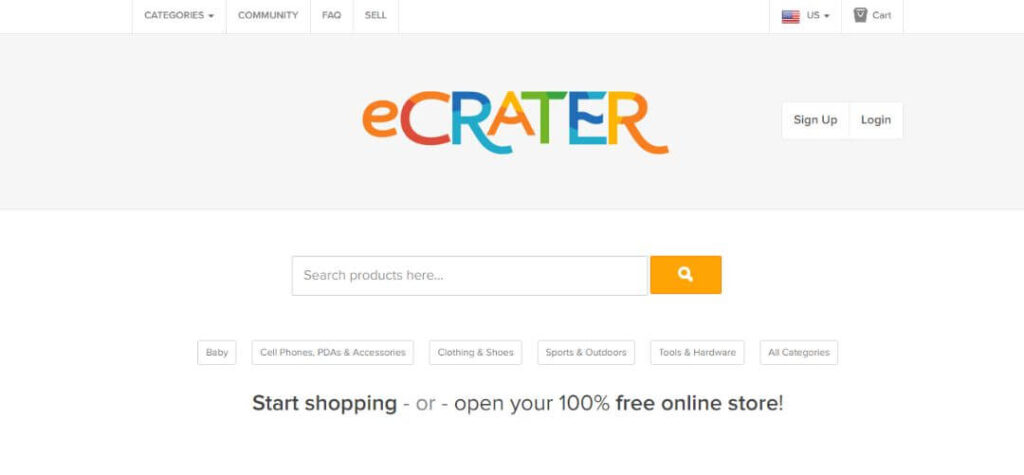Start Selling Handmade Jewelry Using These 11 Easy Options: Best Places To Sell Handmade Jewelry Online
Are you passionate about creating exquisite handmade jewelry? Are you looking for ways to turn your hobby into a profitable venture? Look no further! In this article, we will explore 11 easy options for you to start selling your handmade jewelry and turn your creative talents into a thriving business.
Handmade jewelry holds a special allure for customers seeking unique, one-of-a-kind pieces crafted with love and attention to detail. With the rise of e-commerce and online marketplaces, there has never been a better time to showcase and sell your handmade creations to a global audience.
We will guide you through various selling options, catering to different budgets, time commitments, and marketing strategies. Whether you prefer the convenience of online platforms like Etsy, eBay, or Shopify, or the personalized touch of local craft fairs, consignment shops, or pop-up markets, we’ve got you covered.
So, if you’re ready to turn your passion for handmade jewelry into a successful business, grab your tools and explore these 11 easy options that will pave the way to your entrepreneurial journey. Get ready to dazzle the world with your unique creations.
When it comes to selling jewelry online, several marketplaces can help you reach a broad audience and boost your sales. This article will discuss some of the best marketplaces to sell jewelry online, including their overviews, pros, and cons. Let’s dive in!
Best Places To Sell Handmade Jewelry Online
1. Etsy

Etsy is an online marketplace where individuals can sell handmade or vintage items. It provides a platform for artisans and crafters to showcase their unique creations to a global audience, offering a wide range of products.
Etsy is one of the most popular online marketplaces for handmade and vintage items, including jewelry. It provides a platform for independent sellers to showcase their unique creations and connect with a large community of buyers who appreciate handmade goods.
Pros:
Cons:
- With many sellers on Etsy, competition can be fierce, making it challenging to stand out.
- Etsy charges fees for listing and selling items, including transaction and advertising fees.
- The platform’s search algorithm may favor established sellers, making it harder for new sellers to gain visibility.
2. Amazon Handmade

Amazon Handmade is a section of the Amazon marketplace dedicated to handmade products. It allows artisans to sell their handcrafted items, providing them with a large customer base and access to Amazon’s distribution network.
Amazon Handmade is a section within the broader Amazon marketplace dedicated to selling handmade products, including jewelry. It provides sellers access to Amazon’s vast customer base and robust infrastructure.
Pros:
- Selling on Amazon Handmade exposes you to a massive audience, increasing the chances of making sales.
- The platform offers fulfillment services through Amazon’s renowned FBA (Fulfilment by Amazon) program, which can simplify shipping and customer service.
- Amazon’s reputation and trustworthiness can help build credibility for your brand.
Cons:
- Amazon Handmade has a stringent application process to ensure the products are genuinely handmade, which can be time-consuming.
- The marketplace charges various fees, including listing, referral, and storage fees.
- The competition on Amazon can be intense, and it may be challenging to differentiate your jewelry from other sellers.
3. ECrater

ECrater is an online marketplace that enables individuals to create their online stores. It offers a user-friendly platform for sellers to list and sell their products, including handmade items, collectibles, and other merchandise.
ECrater is an online marketplace allowing sellers to set up online stores for free. It offers a simple and user-friendly platform for selling various products, including jewelry.
Pros:
Cons:
- While eCrater offers a free platform, it may need more traffic and customer base as more significant marketplaces like Etsy or Amazon.
- Limited marketing and promotional tools compared to other marketplaces.
- The platform’s design and user experience may not be as sophisticated as other marketplaces.
4. Craft Shows & Events
Craft shows and events are physical gatherings where artisans and crafters showcase and sell handmade products. These events provide an opportunity for direct interaction with customers and networking with other artisans.
Participating in craft shows and events is an excellent way to showcase your jewelry in person and connect directly with potential customers. These events can range from local craft fairs to large-scale trade shows.
Pros:
Cons:
- Participation in craft shows and events requires upfront costs such as booth fees, travel expenses, and inventory investment.
- Your sales may depend on the popularity and attendance of the specific event.
- Limited geographic reach compared to online marketplaces, as you can only sell to customers attending the event.
Also check the following:
- 8 Top Ways To Get Paid To Review Movies For Money On Free Time
- 9 Best Voice-Over Websites To Find Voice Freelance Gig In 2023
- 11 Top Ways To Make Money With Canva: Side Hustle Using Canva
5. Boutiques
Boutiques are small, specialized retail stores often focusing on unique and handcrafted items. They offer a curated selection of products, including handmade goods, providing a personalized shopping experience.
Selling jewelry through boutiques involves partnering with small retail stores that curate a collection of unique and independent brands. It can provide exposure to a targeted audience seeking handcrafted and artisanal products.
Pros:
Cons:
- Finding suitable boutiques and establishing partnerships can be time-consuming and require networking efforts.
- The profit margin may be lower when selling through boutiques, as they typically take a commission or wholesale price.
- Your jewelry may face competition from other brands within the same boutique.
6. Consignment Shops

Consignment shops are retail stores that sell second-hand items on behalf of the owner. They can be a platform for artisans to sell their handmade goods on consignment, reaching a wider audience without needing storefronts.
Consignment shops allow you to display and sell your jewelry while the shop owner handles the sales transactions. Once your item sells, you receive a percentage of the sale price.
Pros:
Cons:
- The percentage commission charged by consignment shops can reduce your profit margins.
- Consignment shops may have limited space, and your jewelry might be less visible than in your store.
- There is a risk of theft or damage to your jewelry displayed in the consignment shop.
7. Home Shopping Parties
Home shopping parties involve hosting gatherings at homes where individuals can view and purchase products, including handmade items. These events provide a social and interactive shopping experience, often organized by independent consultants.
Hosting home shopping parties involves inviting friends, family, and acquaintances to your home or a chosen venue to showcase and sell your jewelry in a social and relaxed setting.
Pros:
Cons:
- The success of home shopping parties heavily relies on your ability to attract attendees and generate interest.
- Hosting parties may require upfront costs for refreshments, decorations, and other event-related expenses.
- The geographical reach is limited to the attendees and their networks, potentially limiting your customer base.
8. Facebook Marketplace

Facebook Marketplace is a platform within the social media platform that enables users to buy and sell various items, including handmade products. It allows artisans to reach a local audience and connect directly with potential customers.
Facebook Marketplace is a platform where users can buy and sell various items, including jewelry. It leverages Facebook’s extensive user base and social connections to facilitate local transactions.
Pros:
Cons:
- The competition on Facebook Marketplace can be intense, with numerous sellers vying for attention.
- The platform focuses primarily on local transactions, which may limit the potential customer base for specialized or niche jewelry.
- There needs to be more specialized features and tools specifically tailored for jewelry sellers compared to dedicated marketplaces.
9. Kijiji / Craigslist

Kijiji and Craigslist are online classified advertisement platforms where individuals can buy and sell various items, including handmade products. These platforms provide a local marketplace for artisans to connect with buyers in their area. Kijiji and Craigslist are classified advertisement websites that enable users to list and sell various items, including jewelry, in their local area.
Pros:
Cons:
- A dedicated marketplace for jewelry is necessary for your items to get noticed among many other listings.
- Transactions on Kijiji and Craigslist involve meeting buyers in person, which can be a safety concern for some sellers.
- The platforms may need specialized features and tools specifically designed for jewelry sellers.
10. Social Media

Social media platforms like Instagram, Pinterest, and Twitter allow artisans to showcase and sell handmade products. They can create a visual portfolio, engage with followers, and promote their creations to a global audience.
Social media platforms such as Instagram, Facebook, and Pinterest can be utilized to showcase and sell jewelry directly to your followers and engage with potential customers.
Pros:
Cons:
- Gaining a significant following on social media can take time and effort.
- Social media platform algorithms may limit your posts’ visibility, requiring additional promotional efforts.
- Transaction and payment processes may need to be managed manually, which can be time-consuming.
11. Zibbet
Zibbet is an online marketplace designed explicitly for handmade and vintage products. It offers a platform for artisans to showcase and sell their unique items, providing a community of like-minded sellers and features for customization and branding.
Zibbet is an online marketplace for independent artists, crafters, and vintage sellers. It provides a platform to showcase and sell handmade jewelry and other creative products.
Pros:
Cons:
- The customer base on Zibbet may be smaller than more significant marketplaces like Etsy or Amazon.
- The platform’s interface and user experience may be less polished and more intuitive than other marketplaces.
- Limited marketing and promotional features compared to more established marketplaces.
Read this:
- 7 Best Day Jobs For Writers Living Writing To Grow Their Business
- Is Testerup Legit? Revealing The Truth About This Testing App 2023
FAQs On Best Places To Sell Jewelry Online
How do I start selling handmade jewelry?
To start selling handmade jewelry, begin by honing your craft and creating a unique collection. Research online platforms like Etsy, Amazon Handmade, or Zibbet and set up a shop.
Take high-quality product photos, write compelling descriptions, and price your items competitively. Promote your jewelry through social media, craft shows, or boutiques. Establish a brand and provide excellent customer service to build a loyal customer base.
How can I market my handmade jewelry effectively?
Marketing your handmade jewelry requires a multi-faceted approach. Utilize social media platforms like Instagram, Facebook, and Pinterest to showcase your creations, engage with followers, and run targeted ads. Collaborate with influencers or jewelry bloggers for product features or reviews.
Attend craft shows and events to showcase your jewelry in person and connect with potential customers. Consider offering promotions, discounts, or limited-edition collections to generate interest and create a sense of exclusivity.
How should I price my handmade jewelry?
Pricing handmade jewelry involves considering materials, labor, overhead expenses, and desired profit margins. Research the market to understand pricing trends for similar pieces. Consider your jewelry’s uniqueness, craftsmanship, and quality when setting prices.
Don’t undervalue your work, but also remain competitive. Test different price points and gather customer feedback to find the sweet spot that balances profitability with customer satisfaction.
How can I ensure the quality of my handmade jewelry?
Maintaining quality is crucial for the success of your handmade jewelry business. Source high-quality materials and invest in reliable tools. Pay attention to details like finishes, clasps, and findings. Regularly inspect your pieces for any flaws or defects.
Offer clear product descriptions and accurate measurements. Listen to customer feedback and address any quality concerns promptly. Strive for consistency in craftsmanship to build a reputation for delivering top-notch, reliable jewelry.
How can I stand out in the saturated handmade jewelry market?
Focus on developing a unique style or niche for your jewelry to stand out in a competitive market. Experiment with different designs, materials, or techniques to create distinctive pieces that cater to a specific target audience. Develop a strong brand identity and storytelling around your jewelry.
Offer customization options or personalized touches to make each piece unique. Engage with your customers, build relationships, and provide exceptional customer service. Collaborate with other artists or professionals to create limited-edition or exclusive collections that generate buzz and interest.
Conclusion: Start Selling Handmade Jewelry
In conclusion, numerous marketplaces and platforms are available for selling jewelry online, each with advantages and disadvantages. The choice of the best marketplace for you depends on factors such as your target audience, budget, desired level of control, and marketing capabilities.
Researching and evaluating different options is essential to find the platform that aligns with your business goals and helps you reach the right customers for your unique jewelry creations.
So, if you want to start selling handmade jewelry, you have various easy options. Online platforms like Etsy, Amazon Handmade, eCrater, and Zibbet provide a global reach and access to a large customer base.
Participating in craft shows, events, and boutiques allows direct customer interaction and networking opportunities. Consignment shops offer a chance to sell on consignment without needing your store.
Hosting home shopping parties and utilizing platforms like Facebook Marketplace, Kijiji, and Craigslist provide local selling opportunities. Finally, leveraging social media platforms allows you to showcase and promote your creations worldwide. With these 11 options, you have the flexibility to start and grow your handmade jewelry business successfully.













